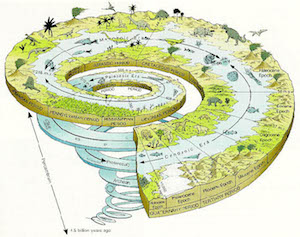What lies ahead for our continually changing timeline?
Scientist must understand that any idea of the past should not be held on to without a bit of skepticism and doubt. Each successive geologist written about here has pushed through previous assumptions in some way to expand the knowledge in the field. So, our understanding now will not be the final word. Realizing this, the International Commission on Stratigraphy (ICS) is working on naming the parts of the timescale in a concise and internationally acceptable way. These goals will be accomplished through updated publications of timelines, education on stratigraphic techniques and general dissemination of ideas regarding stratigraphy. Here is a link to the 2008 stratigraphic chart.
 We might also need to add another entry to the end of the timescale. Several people have come up with an entry along the lines of Anthropocene, ‘anthropo’ relating to human and ‘kainos’ meaning new. Humans contribute to overall changes in Earth’s climate and ecosystems. We first started having a major impact with onset of the Industrial Revolution, although the Anthropocene has no defined beginning as of yet. The Holocene has been defined as the time since humans have integrated farming and animal husbandry into their lifestyle. William Ruddiman wants to start the Anthropocene with the onset of agriculture. Humans have had the greatest or most rapid effect on their environment as far as global change in recent times, since the 1800’s and later. But, Ruddiman claims, all these changes began with the clearing of forests and annexing of wild lands for human use. Is he, therefore, just replacing one name with another? What would the terms Holocene or Quaternary relate to then? Ruddiman seems to be the main proponent for the change in nomenclature. Paul Crutzen, in 2000, coined the term Anthropocene. Andrew Revkin, in 1992, introduced a similar term, Anthrocene. Although neither has been truly accepted, scientists regard Anthropocene as being more technically suitable.
We might also need to add another entry to the end of the timescale. Several people have come up with an entry along the lines of Anthropocene, ‘anthropo’ relating to human and ‘kainos’ meaning new. Humans contribute to overall changes in Earth’s climate and ecosystems. We first started having a major impact with onset of the Industrial Revolution, although the Anthropocene has no defined beginning as of yet. The Holocene has been defined as the time since humans have integrated farming and animal husbandry into their lifestyle. William Ruddiman wants to start the Anthropocene with the onset of agriculture. Humans have had the greatest or most rapid effect on their environment as far as global change in recent times, since the 1800’s and later. But, Ruddiman claims, all these changes began with the clearing of forests and annexing of wild lands for human use. Is he, therefore, just replacing one name with another? What would the terms Holocene or Quaternary relate to then? Ruddiman seems to be the main proponent for the change in nomenclature. Paul Crutzen, in 2000, coined the term Anthropocene. Andrew Revkin, in 1992, introduced a similar term, Anthrocene. Although neither has been truly accepted, scientists regard Anthropocene as being more technically suitable.
The ambiguity of the exact term and what exactly it will define is the antithesis of science. Adding a term to the end of a 4 billion year timescale to denote a few thousand years seems overanxious. While recognizing that our impact definitely deserves note, I assert that our impact does not yet deserve its own entry in the geologic timescale. Writing history as it happens permits the author little time to judge events. With a clear head and longer perspective, mankind will have a better view on his effect on Earth. Perhaps with this in mind, the ICS does not recognize the new terminology. Discussion of the new idea and terminology continues. What, specifically will it denote? What time frame will it describe? Until these answers have been agreed upon, geologists will have to wait to make the next major mark on the geologic time scale.

